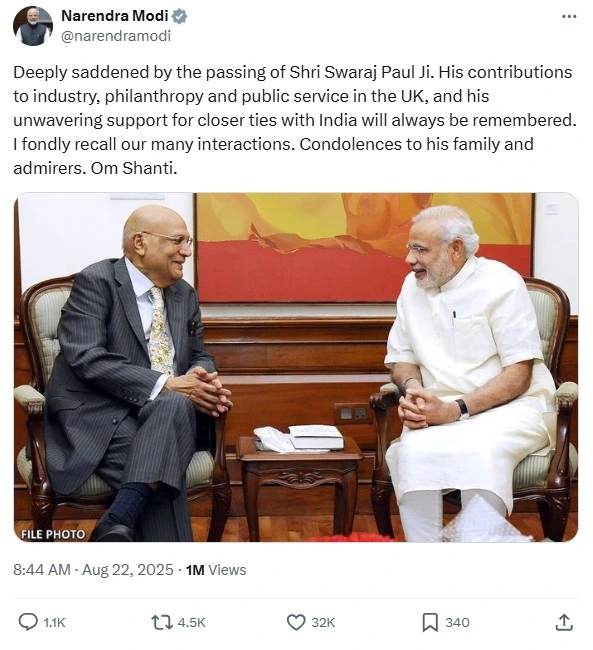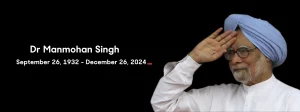(August 24, 2025) Few lives embody the story of the Indian diaspora as completely as Lord Swraj Paul’s. In his journey from Jalandhar to London, he turned tragedy into enterprise, and enterprise into philanthropy and a bridge between India and Britain.
Lord Swraj Paul, the Indian-born steel magnate whose industrial empire spanned continents, who became one of Britain’s wealthiest residents and the first Indian-born Deputy Speaker of the House of Lords, passed away in London on August 21. He was 94. Often described as an elder statesman of the Indian diaspora, he combined industrial success with public service, representing the community’s voice in Britain while keeping strong ties to India.
For decades, he was celebrated as one of the most influential figures of the diaspora: a philanthropist who endowed universities, a businessman who employed tens of thousands, and a statesman who bridged India and Britain. Regularly listed in the Sunday Times Rich List, at the time of his death he ranked among Britain’s wealthiest residents, much of it derived from his Caparo Group of industries.
Awarded the Padma Bhushan by India in 1983 and granted the Freedom of the City of London in 1998, Lord Paul became a symbol of the diaspora’s contributions to both nations. In 2013, he was named International Indian of the Decade; five years later, when the NRI Institute conferred on him the Mahatma Gandhi Honour, he said, “To be associated with Mahatma Gandhi’s name makes me very proud of being Indian and British. I am pleased to make Indians realise what service NRIs have done for India.”
From a small town in Punjab to MIT, from family foundries in India to an industrial empire in Britain, from personal tragedies to global philanthropy, his journey of reinvention transformed him into one of the most influential voices of the Indian diaspora.
Childhood in Punjab and family enterprise
Swraj Paul was born in 1931 in Jalandhar, Punjab, into a modest but enterprising family. His father ran a small foundry making buckets and farming equipment, while his mother nurtured the family with discipline. Their ancestral home in Jalandhar, filled with memories of his early life, later became the site of an Apeejay School, established by his elder brother Dr. Stya Paul as part of the Apeejay Education Society. This transformation of a family home becoming a place of learning echoes the family’s long-standing commitment to education.
The Paul brothers would each leave their mark in different ways. While Stya Paul and Jit Paul carried forward the Apeejay Group, growing it into one of India’s respected business houses with interests in education, real estate, and industry, Swraj Paul charted his own course that would eventually take him across continents.
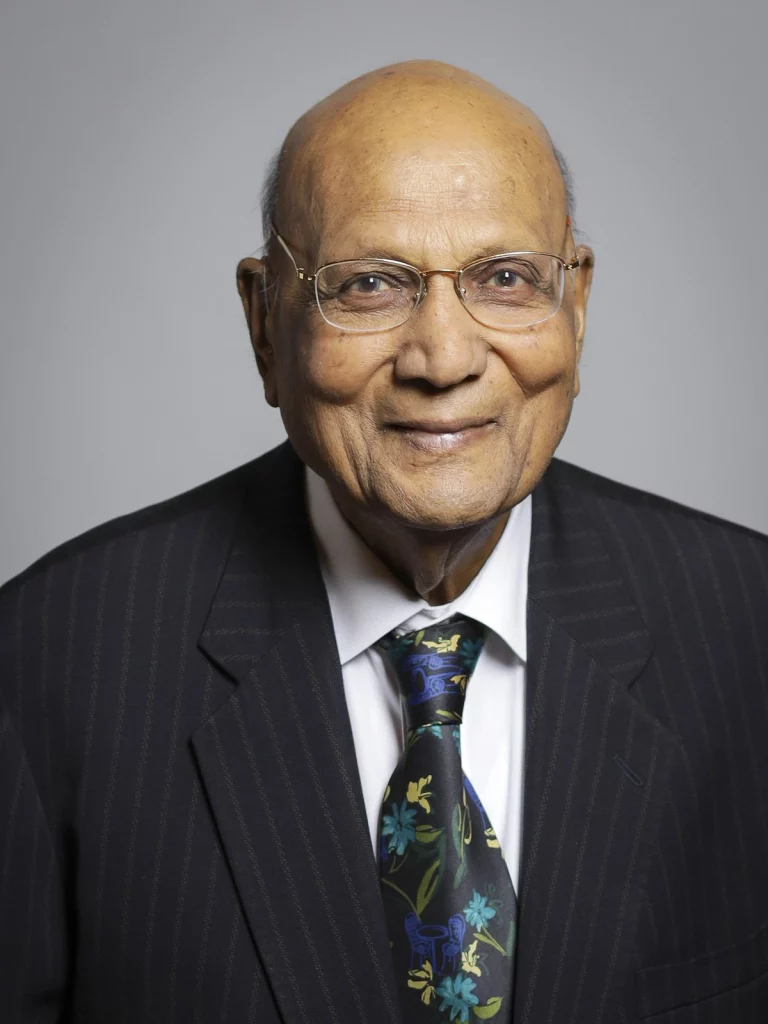
Lord Swraj Paul
MIT and Return to India
Swraj Paul completed high school at Labbu Ram Doaba School before moving to Doaba College and later Forman Christian College in Lahore. Eager to pursue engineering, he studied at the Massachusetts Institute of Technology (MIT), where he earned a BSc, MSc, and MechE in mechanical engineering. The years in Boston broadened his horizons, sharpening his technical brilliance and exposing him to the dynamism of global industry.
After MIT, he returned to India and briefly worked at the family business founded by his father and then managed by his elder brothers, Satya Paul and Jit Paul. This early phase of his career helped him gain first-hand experience of industrial management in the ambitious climate of newly independent India. This grounding in business and engineering would later serve him well as he built his own empire abroad.
A father’s loss, an immigrant’s resolve
Swraj Paul’s life changed irrevocably in 1966, when he and his wife, Aruna, travelled to London seeking treatment for their young daughter Ambika, who had been diagnosed with leukemia. Despite their desperate hopes, Ambika died at the age of four.
The grief was overwhelming, but it did not break him. That journey, born of hope and heartbreak, became the turning point of his life. In his daughter’s memory, he established the Ambika Paul Foundation, which would donate millions to support children’s health and education. The foundation helped create the Ambika Paul Children’s Zoo at Regent’s Park, a place he cherished because, as he explained, “The London Zoo is where she was always the happiest.”
What began as a father’s tribute to a lost child became a philanthropic force that touched lives across the world.
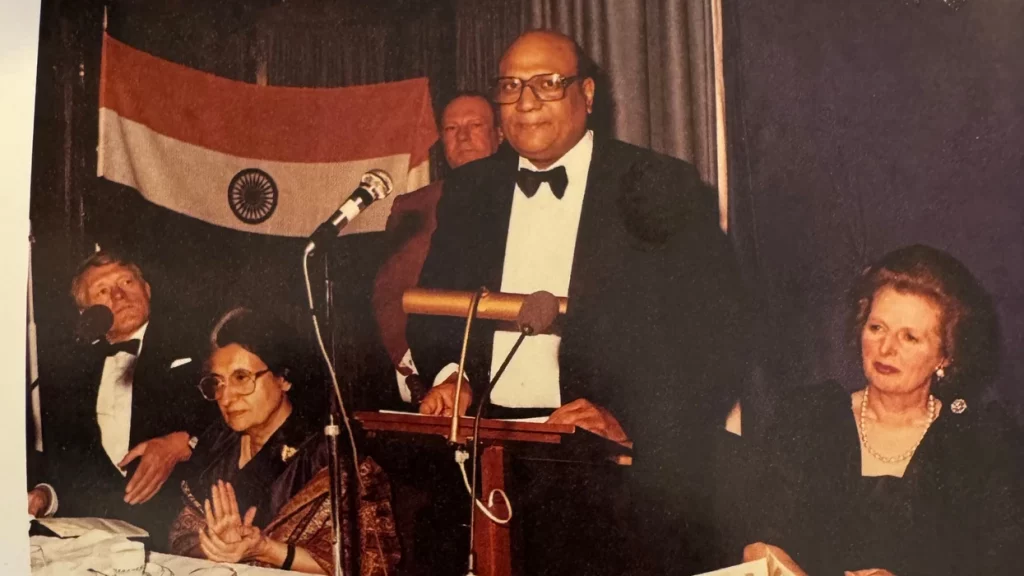
Lord Swraj Paul at an Indo-British Association event in 1982, with Prime Ministers Indira Gandhi and Margaret Thatcher
From building steel units to global reach
Remaining in Britain after his daughter’s death, Paul ventured into business. He began modestly with a small steel tube operation, Natural Gas Tubes, before establishing the Caparo Group in 1968.
The timing seemed unpromising: British industry was in decline. Yet Paul, drawing on his MIT training and Indian entrepreneurial grit, saw opportunity in adversity. He acquired failing steel units and turned them around, building Caparo into one of Britain’s largest privately owned steel conversion and engineering groups.
Caparo’s operations spanned over 40 sites, with interests in structural steels, automotive engineering, and industrial wires. At its height, it employed more than 10,000 people across the UK, the United States, India, and the Middle East.
Caparo was more than an industrial success. It was proof that an immigrant could thrive at the very heart of Britain’s economy. It was a source of pride not only to Paul but to the wider Indian diaspora.
Public service in Britain
In 1996, Paul was made a Life Peer, taking the title Baron Paul of Marylebone. In December 2008, he became the first Indian-born Deputy Speaker of the House of Lords, and in 2009, he was appointed to the Privy Council.
He described the honour as deeply personal: “It was an honour for someone who came from a freedom fighter’s family in India,” he remarked.
Paul’s service extended beyond parliamentary work. He was a member of the London Development Agency from 2000 to 2008, and as chair of its Olympics Delivery Committee between 2005 and 2008, he oversaw the delivery of land and infrastructure for the London 2012 Olympic Games. The project was completed on time and on budget. It was a feat of precision that echoed his industrial career.
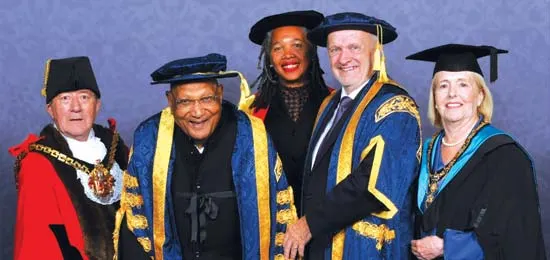
Lord Swraj Paul during the 25th anniversary of chancellorship at the University of Wolverhampton
The chancellor who believed in learning
Education was Paul’s deepest passion, second only to family. In Britain, he served as Pro-Chancellor of Thames Valley University (1992–97), later becoming its Chancellor. In 1999, he was appointed Chancellor of the University of Wolverhampton, a post he held for over 26 years. From 2006 to 2014, he also served as Chancellor of the University of Westminster.
He endowed scholarships, libraries, and cultural institutions. At Westminster, his foundation helped establish Ambika P3, a vast exhibition and performance space that became a cornerstone of London’s cultural life. At Wolverhampton, his donations included the largest single gift in the university’s history.
He also gave generously to MIT, Chapman University in California, and institutions in India, funding study spaces and scholarship programs.
When his son Akash was awarded an honorary doctorate at Wolverhampton in 2023, he joked with pride: “Perhaps I am the only graduate to get a degree from his own father, independently approved by the University Board, of course, I may add.”
Diaspora statesman
Lord Paul was often described as the “doyen of the Indian diaspora.” His recognition by India with the Padma Bhushan in 1983 symbolized his dual identity. He was both a British industrialist and an Indian patriot, working tirelessly to bridge the two nations.
At the 2013 India Link International anniversary, when he was awarded the title International Indian of the Decade, he dedicated the recognition to his wife, Lady Aruna, mentioning, “At the age of 82, I really want to dedicate this award to a wonderful person, my wife Aruna. Without a wife’s support you are nowhere.”
Community leaders saw in him a role model, and were indebted for setting the benchmark for them in business, philanthropy and community engagement.
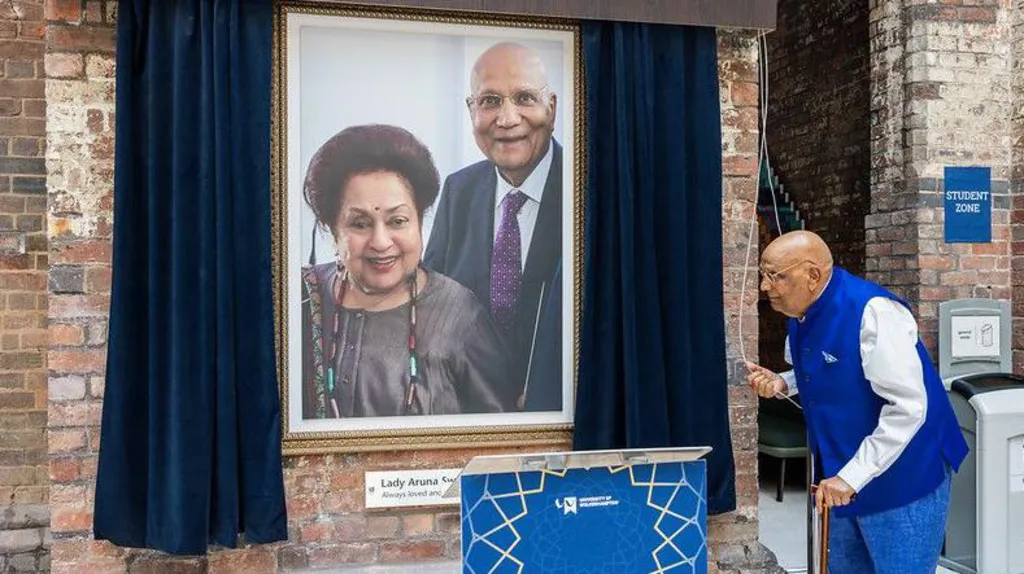
Lord Swaraj Paul at the inauguration of a building in the name of his wife at the University of Wolverhampton
Love, loss, and legacy
Beyond his public achievements, Lord Swraj Paul endured profound personal losses. In 2015, his son Angad Paul, then CEO of Caparo, died. In 2022, he lost his beloved wife, Lady Aruna, after 65 years of marriage.
Yet even in mourning, he found ways to give back. In 2023, he inaugurated the Lady Aruna Swraj Paul Hall at the Indian Gymkhana Club in London, saying: “This hall is a tribute to my wonderful wife whom I miss very much; we never had an argument during our 65 years of marriage.”
His family legacy continues through his son Akash Paul, Chairman of Caparo India and Director of the Caparo Group, ensuring that his vision endures.
Final years and diaspora farewell
Even in his nineties, frail and often in pain, Lord Paul continued to attend sessions in the House of Lords, embodying the discipline that had defined his entire life.
His memoir, Beyond Boundaries, captured both the arc and the ethos of his journey. More than the story of a man, it was the story of the Indian diaspora itself, marked by sacrifice, resilience, and renewal.
Lord Swraj Paul’s passing is not only a family’s loss but a diaspora’s farewell. His life forged in the furnaces of steel, tempered by personal loss, and ennobled by service remains an enduring symbol of what it means to be a Global Indian.
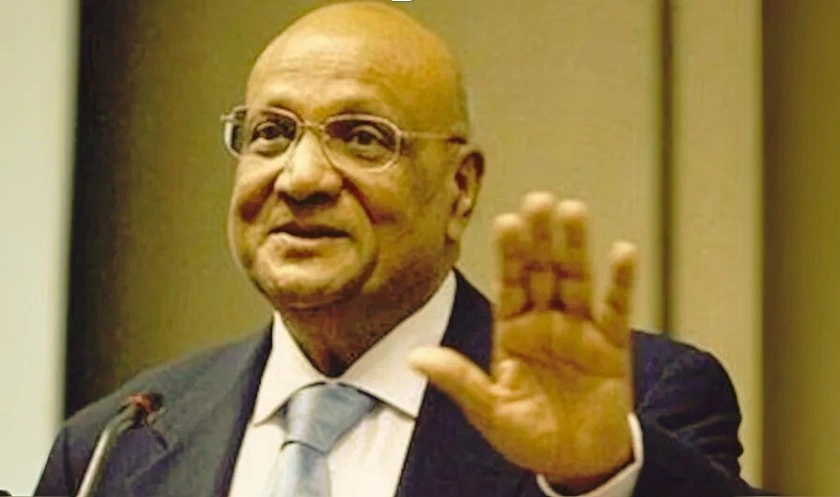
Honours and Awards
-
Padma Bhushan (1983) – India’s high civilian honour for service in industry and philanthropy
-
Freedom of the City of London (1998) – Recognition for contributions to business and public life
-
Corporate Leadership Award, MIT (1989) – For visionary leadership in global manufacturing
-
Asian of the Year Award (1987) – For pioneering success among Asians in Britain
-
International Indian of the Decade (2013) – By India Link International for diaspora service
-
Mahatma Gandhi Honour (2018) – By NRI Institute for embodying Gandhian ideals
-
Global Indian of the Year (2011) – By PowerBrands Hall of Fame for global influence
-
Lifetime Achievement Awards (2008–2018) – From global associations for decades of contribution
-
15 Honorary Degrees – From universities in the UK, US, India, and Switzerland

